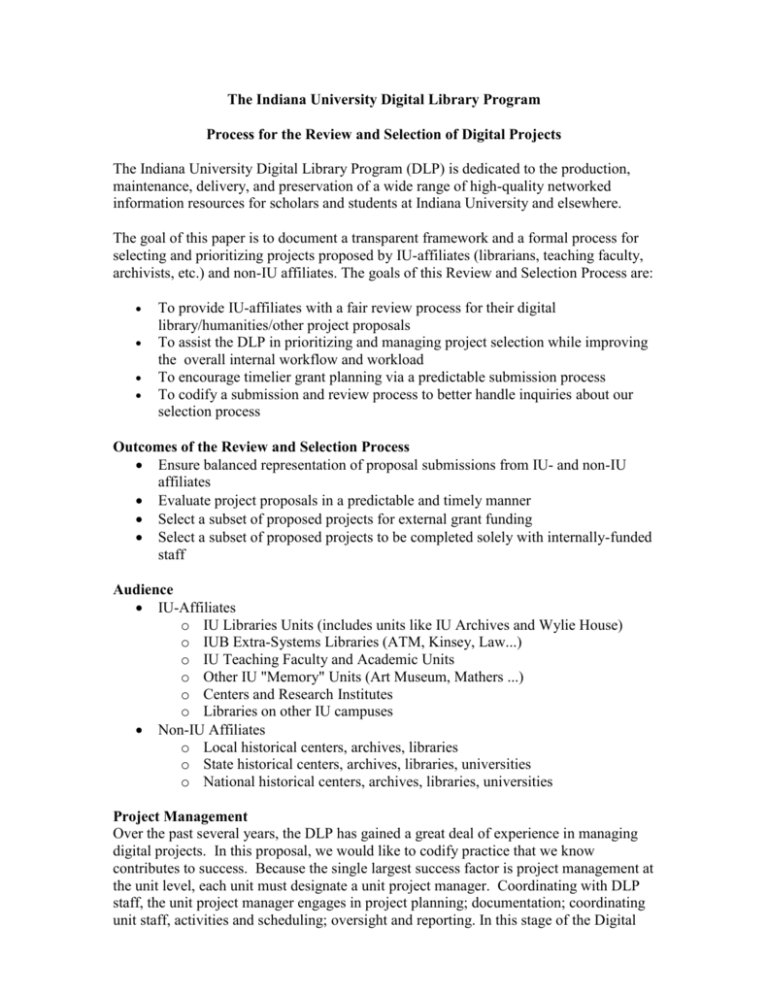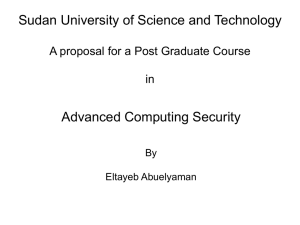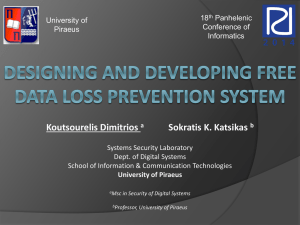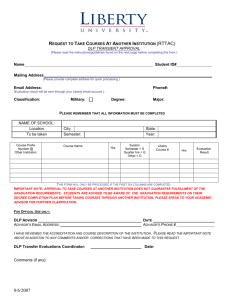Project Planning Process Overview.
advertisement

The Indiana University Digital Library Program Process for the Review and Selection of Digital Projects The Indiana University Digital Library Program (DLP) is dedicated to the production, maintenance, delivery, and preservation of a wide range of high-quality networked information resources for scholars and students at Indiana University and elsewhere. The goal of this paper is to document a transparent framework and a formal process for selecting and prioritizing projects proposed by IU-affiliates (librarians, teaching faculty, archivists, etc.) and non-IU affiliates. The goals of this Review and Selection Process are: To provide IU-affiliates with a fair review process for their digital library/humanities/other project proposals To assist the DLP in prioritizing and managing project selection while improving the overall internal workflow and workload To encourage timelier grant planning via a predictable submission process To codify a submission and review process to better handle inquiries about our selection process Outcomes of the Review and Selection Process Ensure balanced representation of proposal submissions from IU- and non-IU affiliates Evaluate project proposals in a predictable and timely manner Select a subset of proposed projects for external grant funding Select a subset of proposed projects to be completed solely with internally-funded staff Audience IU-Affiliates o IU Libraries Units (includes units like IU Archives and Wylie House) o IUB Extra-Systems Libraries (ATM, Kinsey, Law...) o IU Teaching Faculty and Academic Units o Other IU "Memory" Units (Art Museum, Mathers ...) o Centers and Research Institutes o Libraries on other IU campuses Non-IU Affiliates o Local historical centers, archives, libraries o State historical centers, archives, libraries, universities o National historical centers, archives, libraries, universities Project Management Over the past several years, the DLP has gained a great deal of experience in managing digital projects. In this proposal, we would like to codify practice that we know contributes to success. Because the single largest success factor is project management at the unit level, each unit must designate a unit project manager. Coordinating with DLP staff, the unit project manager engages in project planning; documentation; coordinating unit staff, activities and scheduling; oversight and reporting. In this stage of the Digital Library Program’s development, projects are collaborative in nature and are likely to entail participation in the planning and development of new systems and services with DLP staff. As more systems and services become operational, the level of commitment in this area may change. The Review and Selection Process The process is relatively simple. A project proposal form (see appendix A) is submitted following the guidelines (see Appendix B). The proposal is reviewed by the DLP and is rated by difficulty and ability to enhance the infrastructure as well as the other criteria found in Appendix C. These ratings are passed to a Digital Projects Review Committee who will select and prioritize the proposals. The Digital Projects Review Committee will also consider teaching faculty-initiated projects until the Digital Arts and Humanities Center and the other centers form and develop. Discussions between the DLP and the Centers will determine relationship and review process for teaching faculty projects. Reviews will occur either three times a year (fall, spring and summer) or bi-annually (schedule to be determined). The proposer has an idea, writes a project proposal, optionally consults with the DLP, and sends it to the DLP DLP staff meets with proposer (optional) Project Proposal DLP Admin Team Reviews Proposals Proposal is rejected. Comments sent to proposer Request for more information Proposals are first reviewed by DLP staff. If more information is requried, DLP Staff contacts the proposer. On a schedule, the Digital Review Committee will meet to review the proposals. If the committee has questions, they contact the proposer. Digital Projects Review Committee Accepted Projects Externally Funded Projects Grant Proposals Developed Accepted Projects are scheduled based on technical and resource constraints Internally Funded Projects Project Plans Developed 2 Below is an overview of the proposal review and routing process: Step 1: DLP Admin Team Review All proposals solicited will be vetted initially by the DLP Admin team o Team will review and rate projects according to the criteria defined in Appendix C o Recommendations/ratings are sent to the Digital Projects Review Committee Step 2: Digital Projects Review Committee The Digital Projects Review Committee is convened by the Associate Dean of Information Technology Services. The committee generally includes a balanced mixture of collection/content and technical expertise and that membership not exceed ten members for effective discussion. The committee will review, rate and rank projects in light of DLP recommendations using the criteria in Appendix C The committee will write a summary report that will recommend a subset of the proposed projects for the DLP to work on. Projects will be scheduled based on technical issues and resource availability as analyzed by the DLP. Step 3: Dean and DLP Action Committee will send forward final recommendations to Dean o The Dean will approve the final list o If changes are required, the committee will be notified DLP Admin Team will determine the actual implementation schedules based on resources and other constraints. 3 Appendix A – Project Proposal Form DIGITAL LIBRARY PROGRAM PROJECT PROPOSAL FORM Please e-mail this form with all supporting documents to dlp_projects-l@indiana.edu Date Submitted: _______________ Your Name: ____________________________________________________ Email Address: _____________________ Phone: ____________________ Department/Campus: ____________________________________________ Project Name: ___________________________________________________ 1. Please describe your project. 2. Describe the significance of this project to the IU community and beyond. Will this complement or enhance other digital resources? 3. Describe current and potential users. Is there faculty, library, or departmental interest and support for digitizing these materials for either research or teaching purposes? 4. Describe types of materials to be digitized and number of each (i.e.: 6 books with a total of 700 pages, 600 black and while photographs). Include format, condition, and any special handling requirements. 5. Do you have any existing descriptive information that could be used for searching these materials? In what form does this descriptive information exist (on paper, in a Word document, in an Excel file, in IUCAT, etc.) 6. How do you envision people accessing your materials? Are their similar resources that you could give as examples? 4 7. Describe the contribution you and your staff can make to this project. Please name the project manager for your project. 8. Are you expecting to receive external funding for this project? Do you have funding sources in mind? What are the dates for submission for these opportunities? 9. Do you have any other general comments, questions or concerns about this project? 10. Copyright Status Please refer to the Copyright Management Center at http://www.copyright.iupui.edu/quickguide.htm for information to help you determine the copyright status of your materials. Below, please explain your understanding of the copyright status of the material. ________ Public domain ________ Owned and controlled by Indiana University ________ Owned by someone else, but permission secured ________ Situation unknown or unclear Copyright explanation: Revised January 24, 2008 5 Appendix B - DLP DIGITAL PROJECT PROPOSAL GUIDELINES These guidelines and the Digital Project Proposal form are provided to assist Project Managers with the formulation of project proposals. Project Proposals Proposals are encouraged and accepted on a continual basis. Deadlines for review of Preliminary Proposals occur in mid-October* and mid-April* each year. The Digital Library Program staff is available for consultation and advice on formulating project proposals and determining the scope of projects. A Call for Proposals will be posted and advertised at least two months prior to the deadline. (* dates are yet to be decided). Accepted Proposals After review of preliminary proposals, the Digital Projects Review Committee will invite Project Managers of selected projects to develop full project plans. Projects that need external funding will be invited to develop full grant proposals which will require additional development of work plans and budgets. At this stage, the DLP staff will be available to assist Project Managers in the development of proposals and work plans, to recommend systems and services, and to provide technical specifications for the project. DLP Assistance Since DLP systems, services and expertise are developing on a continual basis, consultation with the DLP team is key to writing successful proposals. The team is available to provide advice and assistance at all stages of project development from preliminary proposals through project completion. Current contact information is available on the DLP web site www.dlib.indiana.edu Project Management Over the past several years, the DLP has gained a great deal of experience in managing digital projects. Because the single largest success factor is project management at the unit level, each unit must designate a unit project manager. Coordinating with DLP staff, the unit project manager engages in project planning; documentation; coordination of unit staff, activities and scheduling; oversight and reporting. In this stage of the Digital Library Program’s development, projects are collaborative in nature and are likely to entail participation in the planning and development of new systems and services with DLP staff. The position of project manager demands between 20% and 30% of the workweek, with an average of 10 hours/week. For projects of a large scope, management may require up to 50% of the Project Manager's time. As more systems and services become operational, the level of commitment in this area may change. To ensure project success, consult the Digital Library Program about the likely commitment required for specific projects and about options for hiring and/or sharing the responsibilities. Meetings and Reports The Digital Library Program staff and the Project Manager will meet regularly to assess project status and track progress. Most projects will meet bimonthly, but some short-term projects will require more frequent tracking. The appropriate number of meetings should be scheduled as part of the work plan. 6 Appendix C - Rating Criteria Rating Criteria Relevance/impact of collection (significance, usage, etc.) o Audience (Teaching faculty, librarian, etc.) o Broad audience o Narrow Audience Types of materials (format, condition) o Known / Unknown Formats o Good, Fair, Poor Copyright o no risk, low risk, high risk Effort/Complexity (original cataloging? functional requirements?) o High Effort - more than 12 effort months o Medium Effort - between 6 and twelve effort months o Low Effort - less than 6 effort months Enhance DLP infrastructure (promote innovation, growth, fill holes, etc.) o High, Medium, Low Strategic enhancement Y/N Partner contribution o Staff Resources contributed o Financial Resources contributed o Project management resources required Grant funding opportunity o Y/N 7







